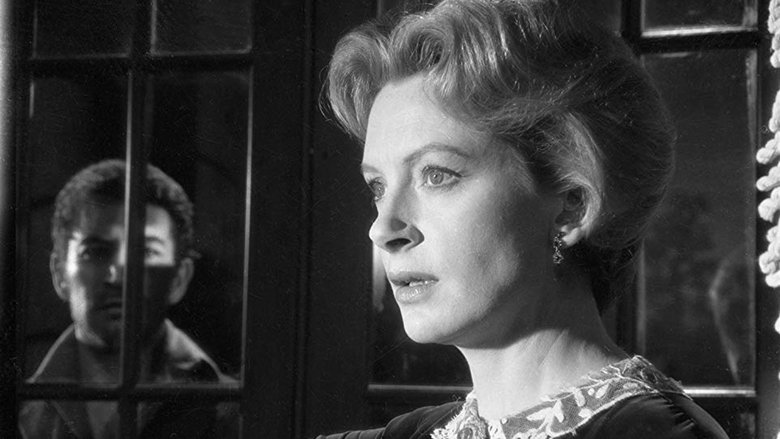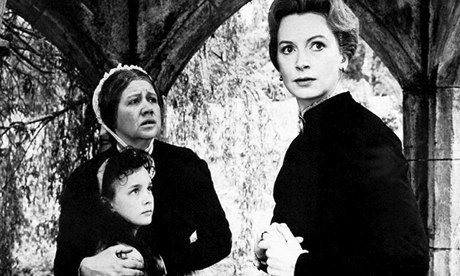← Back to Reviews

in
The Innocents (1961) directed by Jack Clayton
Young and beautiful Miss Giddens gets her very first job as a governess in a remote country house to two children, Miles aged 10 and Flora aged 8 . Their uncle who is their guardian lives in London and is very firm in his intentions of not having anything to do with the children and that all responsibility would be with her as governess.
The Innocents is a fairly faithful telling of the Henry James story The Turn of the Screw, a famous gothic tale published in 1898. This film retelling is wonderfully creepy. Deborah Kerr as Miss Giddens begins her job happy that she has charge of two seemingly lovely children in a beautiful house surrounded by acres of gardens. She has a friend in the housekeeper Mrs Grose and all seems well, that is until she learns that the death of the previous governess isn't all it seems, and that the children are preternaturally knowing. Miss Giddens feverish imagination casts the children as being possessed by the souls of Miss Jessel and her lover....can this be true?
A terrible sense of dread creeps through the film, and the fine performances of the youngsters - Flora with her cunning smiles and Miles with his precociously adult mannerisms add to the atmosphere.

There's a very, very fine frisson of sexual tension running through the final scenes that's quite interesting, and as Miss Giddens gets more intent on proving her theory then her state of mind begins to be doubted by the viewer. That's very well done, and a tribute to Deborah Kerr's acting that our judgement sways one way and the other.
The child actors are very good. The 11 year old Pamela Franklin would go on to play in many more films, while Martin Stephens played more roles but quit acting while still a kid. My favourite actor in this film tho is the wonderful Megs Jenkins (Mrs Grose), a stalwart of British film,tv and theatre who most often played mumsy types she just had one of those faces
The famous British writer John Mortimer also wrote some scenes. William Archibald adapted his theatre play for the screenplay to which Truman Capote also contributed.

An excellent example of a ghost story that can haunt you with no more than a glance through a window or a form seen far away. Give me this anyday rather than blood and gore!
4.5/5
Young and beautiful Miss Giddens gets her very first job as a governess in a remote country house to two children, Miles aged 10 and Flora aged 8 . Their uncle who is their guardian lives in London and is very firm in his intentions of not having anything to do with the children and that all responsibility would be with her as governess.
The Innocents is a fairly faithful telling of the Henry James story The Turn of the Screw, a famous gothic tale published in 1898. This film retelling is wonderfully creepy. Deborah Kerr as Miss Giddens begins her job happy that she has charge of two seemingly lovely children in a beautiful house surrounded by acres of gardens. She has a friend in the housekeeper Mrs Grose and all seems well, that is until she learns that the death of the previous governess isn't all it seems, and that the children are preternaturally knowing. Miss Giddens feverish imagination casts the children as being possessed by the souls of Miss Jessel and her lover....can this be true?
A terrible sense of dread creeps through the film, and the fine performances of the youngsters - Flora with her cunning smiles and Miles with his precociously adult mannerisms add to the atmosphere.

There's a very, very fine frisson of sexual tension running through the final scenes that's quite interesting, and as Miss Giddens gets more intent on proving her theory then her state of mind begins to be doubted by the viewer. That's very well done, and a tribute to Deborah Kerr's acting that our judgement sways one way and the other.
The child actors are very good. The 11 year old Pamela Franklin would go on to play in many more films, while Martin Stephens played more roles but quit acting while still a kid. My favourite actor in this film tho is the wonderful Megs Jenkins (Mrs Grose), a stalwart of British film,tv and theatre who most often played mumsy types she just had one of those faces

The famous British writer John Mortimer also wrote some scenes. William Archibald adapted his theatre play for the screenplay to which Truman Capote also contributed.

An excellent example of a ghost story that can haunt you with no more than a glance through a window or a form seen far away. Give me this anyday rather than blood and gore!
4.5/5
